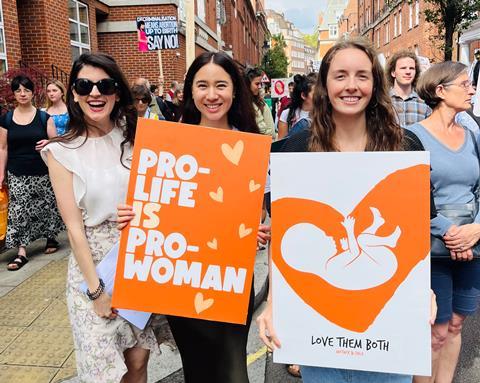Losing followers and being trolled by strangers is one thing, but being abandoned by friends, ghosted by colleagues and blacklisted from former streams of income is quite the other. Trusting everything to God is the difficult but only answer, says Delphine Chui

As a Millennial woman and a self-confessed people-pleaser, I like to be liked.
Yet, as a Christian with traditional and conservative values, I am slowly understanding that this is a recipe for sheer disappointment. Call me naïve, but I thought we, in Britain, lived in a free and democratic society.
Having sat through hours of diversity and inclusivity workshops in secular organisations during my career in women’s magazine journalism, I championed the industry for representing and empowering women.
Anything I put on my personal social media channels loses me not just followers but also real-life friends
What I didn’t realise was that the word “empowerment” has very different definitions for different people. While I believe that all people - no matter how little or big they are, how young or old they are, how able or capable they are; whether they’re a foetus, a toddler, an adult or an older person - have a fundamental right to life, others call me “anti-women” or “dangerous”.
There’s a common aphorism that the measure of a society’s humanity is how it treats its most vulnerable – and truly, who is more vulnerable than the littlest of our society, unborn babies? Yet, bring up the ‘a word’ (abortion) and most conversations are shut down immediately.
High emotions
The words “abortion” and “pro-life’” evoke a lot of emotion. I’ve had close friends triggered by the impression that I’m calling them “anti-life” but lying to women about the realities of abortion – in other words, sugarcoating the ending of a baby’s life – isn’t “pro-choice” to me.
Despite the pretty packaging of so-called tolerance and inclusivity, having a viewpoint that swims against the tide of popular culture is not encouraged. Instead of friendly debates, it seems that our workplaces and friendship circles only allow conformity. Voice an unpopular belief and you’re at risk of being cancelled, mocked and ousted, both socially and professionally.
In an era of the “you do you” mantra, too many of us are scared to voice our deeply held convictions. We naturally don’t want to be called names, used as an example, avoided or confronted by friends, and we certainly don’t want to be fired or have work withheld because our values don’t align with those of our employers.
More on abortion
-
The evidence is clear - unborn children feel pain during late abortions
-
In the case of Carla Foster, decriminalising abortion is not the answer
-
The BBC may be trying to silence us but we’re proud to be pro-life
-
Pills by post makes abortion trivial. God is grieved by our actions
-
Abortion is as much a threat to future generations as climate change
I have experienced all of these personal costs – and it isn’t easy. I’ve checked my social media with shaking hands and half-closed eyes; I’ve felt that anxiety in the pit of my stomach whenever a new email notification popped up and I’ve cried countless tears over the cruelty that cancel culture puts you through.
So why do I continue to attend events such as the March For Life UK, which took place this past weekend, or why do I push forward with sharing my views online? I still sometimes question this myself. In fact, as of today (three days after London’s march), I’ve yet to post anything on my Instagram to protect my peace and avoid any drama.
Anything I put on my personal social media channels loses me not just followers but also real-life friends. Having already noticeably lost access to freelance work (and contact) with former colleagues, I’m acutely aware that we are living in a post-free speech era.
When we see something we don’t like, we don’t discuss it or ask questions, we simply brand that idea as toxic and block or troll the person behind the message. Cancel culture scares so many into silence, including myself.
Shoulder to shoulder
I still struggle to be brave. I still shy away from confidently sharing what I know to be objectively true and I certainly try to avoid conflict at all cost. When I find myself in this place of passivity, I remind myself that it isn’t on me to defend my reputation or my views. I can’t control what others think of me, but it is my duty to not let fear breed the belief that my views are in the minority.
Lying to women about the realities of ending a baby’s life isn’t “pro-choice” to me
Enduring mini persecutions at the office watercooler, brunch table or extended family gathering is not easy, and it’s impossible to face alone. Building a community of like-minded people is invaluable, as well as detaching my sense of self-worth from others’ opinions of me.
Yes, conformity is comfortable, but as Pope Benedict XVI once said: “The ways of the Lord are not easy, but we were not created for an easy life, but for great things, for goodness.”



































2 Readers' comments